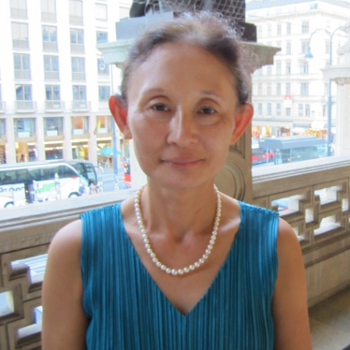Talk about musical chairs. Soprano Elena Pankratova was to make her role debut as Isolde with Munich’s Bayerische Staatsoper, replacing the originally scheduled Anja Harteros. The Baden-Baden Easter Festival called Pankratova at the last minute to save one of the performances of Die Frau ohne Schatten by stepping in for a sick colleague the day before the Munich premiere. Nina Stemme was available to step in for Pankratova in Munich, completing the fortuitous circle. So Pankratova’s debut as the Irish princess was postponed by four days but, even without a complete rehearsal, her performance was worth waiting for. Hers is a refreshingly lyrical and beautiful interpretation of one of the most demanding roles in Wagnerian repertoire.
The production by Krzysztof Warlikowski sets the entire opera in a large room with wood paneling throughout, with minimal props of leather chairs and a long table as needed. In an austere atmosphere, the principals are at times stripped of humanity, even replaced by robot-like figures to represent their emotional state. During the prelude, a boy and a girl wearing a mask to hide their expressions enact a slow-motion dance of love and death. The boy returns in Act 3 to sit on a couch with Kurwenal as therapist, alternating places with the real Tristan. A screen descends on the front of the room to depict the ocean in the prelude, a hotel room where Tristan and Isolde have a secret rendezvous in Act 2, and finally their death by suicide (Isolde takes poison) in Act 3. In the current revival, the singers seem to have managed to insert more emotional connections to one another in the sterile environment, enhancing the pleasure of experiencing Wagner’s most sensual and intimate music played by the excellent Bayerisches Staatsorchester under the sensitive musical direction of Juraj Valčuha.
Stuart Skelton, an experienced Tristan, has the requisite power and stamina for the role, both as a heroic and vulnerable character. His ringing tenor rode above the thick orchestration with thrilling ease in Act 1 and early part of Act 2. He seemed to experience some vocal hiccups during the love duet in Act 2, but was able to carry the nuanced and touching suffering of Tristan in Act 3. In King Marke's brief but gripping appearances in Acts 2 and 3, René Pape showed once again that he is one of reigning Wagnerian basses of our time. His was a masterclass in singing; his booming, sonorous and yet pliable voice and clear diction conveyed the depth of the king’s sorrow, longing, and frustration. As Brangäne, Jamie Barton sang with clarity and sympathy, a great counterpoint to Pankratova’s Isolde in Act 1 and a pained friend in Act 3. As Tristan’s trusted lieutenant Kurwenal, Iain Paterson proved a gruff and sincere friend, especially in Act 3, singing with supportive warmth.
But the real story of the evening was a sensational role debut of a new Isolde, albeit hastily prepared in a short time. Pankratova’s middle voice has a warm and gleaming beauty, and Isolde’s first utterance “Wer wagt mich zu höhnen?” was a thrilling beginning of the joyful evening of hearing a new voice for the role. Her high notes come with some edge but are never shrill; her rich chest voice transitions seamlessly and effortlessly to an open, full and clarion head voice. She incorporated a number of soft pianissimi in her singing, making the character tender and delicate, emphasising the legato in Wagner’s music rather than its declaratory elements. Recent Wagnerian singing, especially in Europe, seems to be moving increasingly away from loud belting and barking to lyrical and nuanced singing by strong but beautiful voices. Pankratova’s Isolde joins this happy new trend. Surrounded by a strong ensemble of colleagues to support her debut, this will hopefully lead to her many future Isolde outings.




